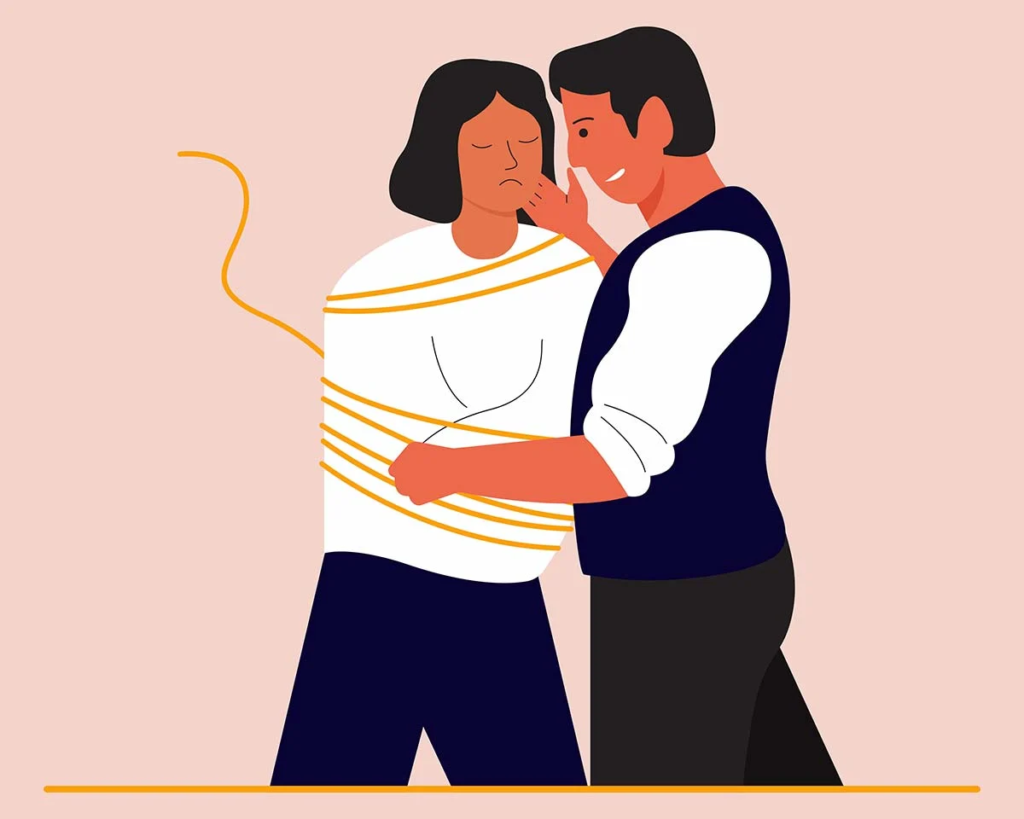Explore what a toxic relationship is, including the common signs and behaviors. Plus, how to end different types of toxic relationships and find healing.

6 signs of a toxic relationship
Recognizing a toxic relationship is not always easy, but acknowledging these patterns is a big step toward making informed decisions about your relationship’s future. Whether it involves seeking help, setting boundaries, or considering ending the relationship, prioritizing your wellbeing is essential.
Feeling unsafe or on edge
In a healthy relationship, you should feel safe and secure, both physically and emotionally. If you find yourself constantly on edge, anxious about how your partner will react, or worried about provoking anger, it’s a sign that the relationship is not a safe space for you.

Consistently disrespected
If you often feel disrespected, whether through words, actions, or disregard for your boundaries and feelings, it’s a clear sign that it’s not a healthy relationship. Disrespect can include public humiliation, private belittlement, or simply ignoring your wishes and needs.
Unmet needs
While no relationship can fulfill every need, consistent unmet emotional, physical, or psychological needs—like a lack of emotional support, intimacy, or mutual respect—are a sign of toxicity.
Often taking the blame
In toxic relationships, one partner may find themselves always blamed, regardless of the situation. This can lead to a distorted sense of self and responsibility for things beyond your control. Being in a submissive or guilty state can prevent you from asserting your needs or rights.
Isolated from friends and family
Isolation is a powerful tool in toxic relationships. It can start subtly but eventually lead to being cut off from your support network, making you less likely to seek help or exit the relationship.
Diminished self-esteem
A significant sign of a toxic relationship can be a noticeable decline in self-esteem. If you find yourself feeling worthless, doubting your abilities, or believing you don’t deserve better treatment, it’s often because of the negative, critical, or dismissive behavior of your partner.
6 types of toxic relationships
Recognizing the specific type of toxic relationship you might be in is crucial for finding the best approach to addressing it. Whether it’s seeking professional help, setting firm boundaries, or leaving the relationship, your wellbeing and safety should be your first priority.
1. Abusive relationships
Abusive relationships are when one partner exerts power and control over the other through physical, emotional, or sexual abuse. This type of relationship is dangerous and can have severe physical and psychological effects on the victim.
If you’re in an abusive relationship, seek immediate help and support to ensure your safety.
💙 You can call the National Domestic Violence Hotline: 1 (800) 799-7233. If you are in the UK, there are additional resources.
2. Codependent relationships
Codependency is where one partner excessively relies on the other for approval and a sense of identity. This dynamic can result in neglecting personal needs, boundaries, and self-worth. Codependent relationships can prevent both partners from experiencing growth and individuality.

3. Relationships marked by infidelity
When one partner repeatedly cheats, it can create a cycle of betrayal, hurt, and often, reconciliation, without addressing the underlying issues. This pattern can keep the relationship in a constant state of turmoil.
4. Relationships with addiction
When one partner struggles with addiction, whether to substances, gambling, or other behaviors, it can create a toxic environment filled with neglect, abuse, or enabling behaviors. The addiction often becomes the central focus of the relationship, overshadowing the needs and wellbeing of both partners.
5. Competing or jealous relationships
When one or both partners feel a constant need to compete with each other rather than support each other’s successes, that’s a sign of toxicity. Jealousy can arise from comparing achievements, appearances, or attention within the relationship, leading to resentment and conflict.
6. Emotionally manipulative relationships
A partner uses emotional manipulation to control or influence the other’s behavior. Tactics may include guilt-tripping, gaslighting, or playing the victim to justify their behavior or decisions, creating a dynamic where one partner is always conceding or compromising their needs and desires.

How to end toxic relationships
Leaving a toxic relationship can be incredibly challenging. Emotional attachment, fear of loneliness, financial dependence, or the hope that the partner will change can all act as powerful anchors, keeping someone tethered to a harmful situation. The cycle of toxicity can erode self-confidence and decision-making abilities, making the prospect of leaving seem daunting or even impossible.
Ending a toxic relationship requires courage, planning, and support, but it’s a pivotal step toward a healthier, happier life. Remember that you’re not alone, and there are resources available to help you. Prioritizing your wellbeing and happiness is not only a right but a step toward fulfilling relationships that bring joy and support into your life.
1. Recognize the need for change
The first step in ending a toxic relationship is acknowledging that the relationship is harmful and that you deserve better. This can be difficult, especially when strong emotions are involved, but it’s essential for your wellbeing and happiness.
💙 Practice seeing, and being with, the truth of your relationship in this session on Deep Acceptance.
2. Seek support
Reach out to trusted friends, family members, or professionals who can offer emotional support and guidance.
💙 Learn how to get the support you really need from others in the Asking for Help session of the Daily Jay.
3. Set clear boundaries
If it’s safe to do so, communicate your boundaries to the other person. Let them know what behaviors are unacceptable and what consequences will follow if they continue. Setting boundaries is a vital step in reclaiming your autonomy and respect.
Source: Calm
